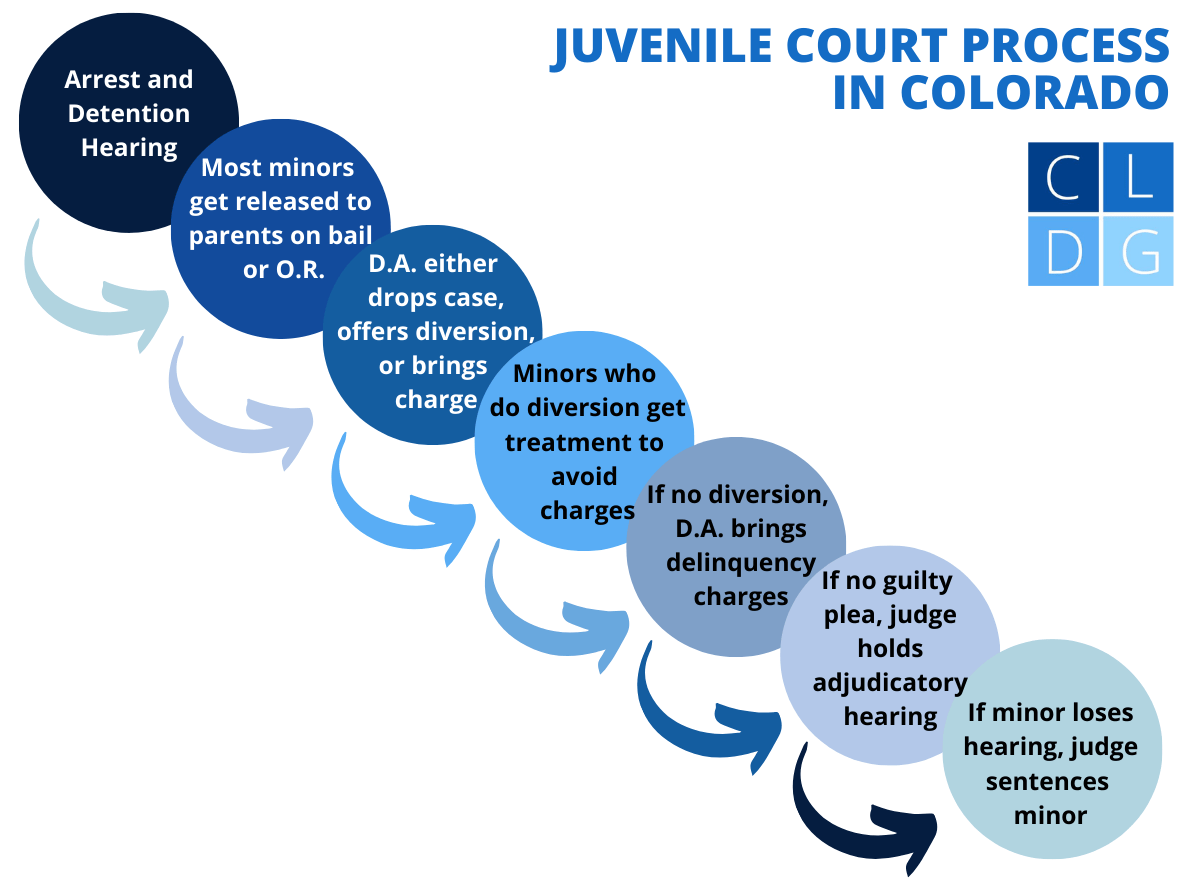In Colorado, children under 18 years old accused of criminal activity get charged in Juvenile Court. In very serious cases, minors may even be tried as adults in criminal court. Many juvenile defendants can avoid prosecution altogether by participating in a rehabilitative diversion program.
However, it is important that they have an experienced Colorado juvenile defense lawyer fighting for the best possible outcome in their case.

In this article, our Denver Colorado criminal defense attorneys discuss:
- 1. How is Colorado’s juvenile justice system different from criminal court?
- 2. What happens when a child is arrested?
- 3. Can I get my child out of Juvenile Detention?
- 4. What is the juvenile court process like in Colorado?
- 5. Can juveniles be charged as adults?
- 6. Should I hire a juvenile crimes attorney for my child?
- 7. What if I was the victim in my child’s case?
- 8. Can juvenile records be expunged?
1. How is Colorado’s juvenile justice system different from criminal court?
Juvenile court handles cases involving only defendants who were under 18 at the time of the alleged delinquent act. In contrast, people who were 18 years of age or older at the time of their alleged law-breaking get charged in adult criminal court.
Juvenile court focuses on rehabilitating minors instead of just punishing them. In contrast, the sentence for most criminal convictions includes only punitive measures like fines and incarceration.1

Hiring a Colorado juvenile criminal defense lawyer ups the odds of getting delinquency charges reduced or dismissed.
2. What happens when a child is arrested?
Following a minor’s arrest in Colorado, law enforcement will notify the parents or guardians. If the violation is minor, the child will typically get released to their parents or guardians as long as they promise to show up to the next court date. But if the allegation involves violence or weapons, there is a mandatory hold on the child while the screening team investigates the case.
Detention hearing
If the minor remains incarcerated, juvenile court will then hold a detention hearing. This court proceeding is where the judge decides if there is enough probable cause to continue detaining the minor on the delinquency allegations. The judge will advise the minor of his/her legal rights. And a public defender will also be assigned to the juvenile unless he/she already has a private attorney.
Detention v. release
The judge has the discretion to keep detaining the minor or else grant bail or personal recognizance (PR) release, where the minor would not have to post any bail. If the judge releases the minor, the judge can also put the minor on supervised pretrial release. Pretrial release terms may include (but are not limited to):
- random drug tests,
- counseling,
- GPS monitoring,
- rehab,
- home visits by officers
Juvenile defendants who violate the terms of their pretrial release risk being detained in Juvi Hall pending the outcome of their case.
Summons v. arrest
Note that sometimes minors are mailed a summons instead of being arrested. In this case, the minor should appear at the court date specified on the summons. This court date is called a “first appearance” or “advisement hearing.” If the child does not have a private attorney, the judge will appoint him/her a public defender.2
3. Can I get my child out of juvenile detention?
During the detention hearing – which is the first hearing following the arrest – the child’s defense attorney may argue for pretrial release from Juvi Hall. The judge is more likely to grant release if:
- the child’s home is stable and safe;
- the child follows household rules;
- the child’s alleged offenses are not serious enough to justify incarceration;
- the child’s family or guardians can look after him/her;
- the child has a clean record; and
- the child is not a runaway and is likely to return to all future court dates
Ultimately, the juvenile court judge decides whether minors may be released from Juvi Hall while their case is ongoing. If the judge sets bail, the child can be released once the money is posted.
Even if the judge initially decides to detain the child, the defense attorney can always ask the judge at a later time to reconsider releasing him/her.3
4. What is the juvenile court process like in Colorado?
Following the child’s arrest (or detention hearing if there is one), the district attorney’s office will conduct a preliminary investigation of the case. At the next hearing – called the return filing hearing – prosecutors will inform the judge whether they will either:
- drop the charge, thereby ending the case; or
- refer the child to a diversion program or informal adjustment, so the child can avoid delinquency charges by completing rehabilitative programs; or
- press delinquency charges by filing a petition spelling out the allegations
Pretrial stage and adjudicatory hearing
If prosecutors press charges, the case enters the pretrial stage. Prosecutors and the defense attorney will negotiate a possible plea bargain. The court may schedule a status hearing so the defense attorney and prosecutors can update the court on the current state of the case. And if no agreement can be reached, the court will schedule a trial – called an adjudicatory hearing.
Depending on the case, the judge may issue a mandatory protection order forbidding the child from contacting alleged victims or witnesses while the case is ongoing. Violating a restraining order makes the juvenile vulnerable to another delinquency charge.
Sentencing
If the child enters a plea or is found delinquent at an adjudicatory hearing, the judge will then hold a sentencing hearing. Possible sentencing terms for being a juvenile delinquent include (but are not limited to):
- community service
- therapy
- anger management
- victim empathy counseling
- fines
- restitution
- physical or mental exams
- supervised work program
- juvenile detention sentence
- probation (minors who violate probation may be remanded to Juvi Hall)
Note that judges may also impose various obligations on the child’s parents or guardians, such as parental responsibility programs. Also note that juveniles found delinquent at an adjudicatory hearing may file a motion for reconsideration and an appeal in an attempt to get the delinquency finding overturned.4
See our related article on Denver Juvenile Court – A Guide for Parents.

Most children who get arrested get released to their parents or legal custodian pending the resolution of the court case.
5. Can juveniles be charged as adults?
Under Colorado state law, a young person aged 12 to 17 can be tried in criminal court for class 1 felony or class 2 felony charges. These include serious violent crimes and sex offenses.
Sometimes a case begins in juvenile court, and the judge agrees to transfer it to criminal court. Other times, prosecutors press charges in criminal court from the start – this is called a direct file. Then the minor can file a reverse-transfer motion in an attempt to get the criminal case moved to juvenile court.
It is always in a child’s best interest to have a case litigated in the juvenile court system rather than the adult criminal justice system. Juvenile court cases have laxer penalties and fewer long-term ramifications than criminal misdemeanor and felony convictions.5
6. Should I hire a juvenile crimes attorney for my child?
Yes, if at all possible. Colorado public defenders simply do not have the time and resources to advocate zealously for each child. And the stakes of each juvenile case is extremely high. In addition to judicial penalties, juvenile offenders face such consequences as expulsion from school and disqualification from scholarship programs.
But an experienced private attorney will fight in pursuit of the best possible outcome in an effort to minimize any harmful long-term consequences of the case on the child’s future. Simply put, private legal representation ups the odds for a better resolution.
7. What if I was the victim in my child’s case?
All victims may be entitled to various victim services through the local D.A.’s office and Colorado’s Division of Criminal Justice. In these cases, the court will usually appoint a GAL (guardian ad litem) to advise the court on what steps would be “in the best interest of the child.”6
8. Can juvenile records be expunged?
Most juvenile records can be expunged eventually under Colorado law unless they involve:
- a homicide conviction
- a felony sex offense conviction
- traffic convictions
- adjudication as a violent juvenile offender or an aggravated juvenile offender7
Learn how to expunge juvenile delinquency criminal records in Colorado.

Call our criminal law firm for legal advice. Our law office offers free consultations and free case evaluations on your legal issues.
Our juvenile defense attorneys defend people under 18 accused of criminal offenses or delinquency allegations by the Colorado juvenile justice system. We can also help seeking to get children released from any of the state’s juvenile halls, including the Adams Youth Services Center, the Gilliam Youth Services Center the Marvin Foote Youth Services Center, the Lookout Mountain Youth Services Center, the Mountain View Youth Services Center, the Platte Valley Youth Services Center, the Pueblo Youth Services Center, and the Grand Mesa Youth Services Center.
Colorado juvenile crimes we defend range from truancy and shoplifting to the unlawful possession of cigarettes, alcohol, or drugs to serious crimes including handguns possession, sex crimes such as sexual assault, and every crime of violence from domestic violence to homicide. We also represent underage drivers accused of violating Colorado’s UDD law — underage DUI.
Our Colorado criminal defense lawyers appear in district courts throughout the state of Colorado, including Denver Metro, Colorado Springs, Greeley, Boulder, Arapahoe, Broomfield, Castle Rock and more. And we defend against all types of juvenile and criminal charges.
In California? See our article on California juvenile laws.
In Nevada? See our article about Nevada juvenile laws.
Disclaimer: Past results do not guarantee future results.
Helpful links
- Department of Human Services Division of Youth Services and Youth Corrections
- Colorado Office for Victims Programs
- Juvenile Justice System Flowchart – Colorado Judicial Branch
- Colorado Revised Statute Title 19 – Children’s Code
- Denver Juvenile Court Handbook
- Colorado Juvenile Justice and Delinquency Prevention (JJDP) Council
- COLORADO – An Assessment of Access to Counsel and Quality of Representation in Juvenile Delinquency Proceedings – Colorado Juvenile Defender Coalition and National Juvenile Defender Center.
Legal References
- CRS 19-2-104.
- CRS 19-2-502; CRS 19-2-509; CRS 19-2-514.
- See CRS 19-2-508. See also People in Interest of E.V., (Colo. App. 2022) 2022 COA 53.
- CRS 19-2.
- CRS 19-2-517; CRS 19-2-518; J.D.C. v. Dist. Court 18th Jud. Dist., (Colo. 1996) 910 P.2d 684.
- See CRS 19-1-111. See, e.g., Colorado Office for Victims Programs.
- CRS 19-1-306; see also C.B. v. People, (Colo. App. 2005) 122 P.3d 1065.
